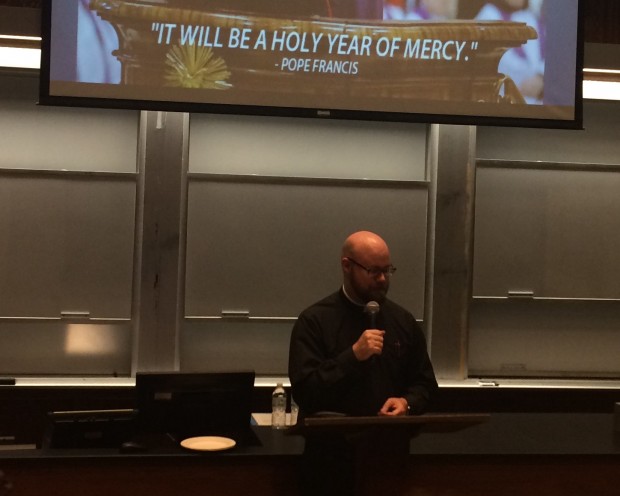
The University of St. Thomas Prolife Center is hosting a series of speakers to address developments in the anti-abortion conversation.
Law professor Teresa Collett, director of the organization, said the center hosts different speakers each semester, although the specific topics of each series always vary.
“We’ve chosen the commodification of human life for the next three lectures. And of course the Holy Father’s declaration of mercy,” Collett said.
In the first segment of the series, “The Pain of Abortion and the Year of Mercy,” the Rev. John Floeder, dean of seminarians, addressed Pope Francis’ recent statement that Dec. 8, 2015 to Nov. 20, 2016 will be the Extraordinary Jubilee of Mercy. He explained the confusion among Catholics when the pope granted priests the faculty to forgive the sin of abortion.
“That’s confusing because … a priest can forgive any sin that comes to him in the confessional,” Floeder said. “What it is, is more to remit the canonical penalty that comes with that.”
Floeder said an important part of his portion of the speech was to reiterate how to put the pope’s message of love and mercy into action.
“(The pope’s) consistent message is that we as the church and all people of goodwill need to go out and walk with people (who struggle),” Floeder said. “My hope is that from Pope Francis’ message, and our message tonight, the people who need healing hopefully are open to places where they can find healing.”
Junior Catholic studies major Liz Maslow thinks these issues are important to discuss in order to open up the dialogue between Catholics and women who have had an abortion.
“It carries a very large stigma I would say,” Maslow said. “Many women are probably very afraid to come and say ‘I’ve done this, but now I’m sorry for it, and I would like to find help, but I feel like everyone’s going to judge me.’ I think it’s very important to bring to light that there is hope, there is forgiveness, there is healing to be found.”
More segments in the series are set to follow. “Surrogacy and the Trafficking in Women Womb’s” and “Patents on Human Life – the Limits of Private Property” will be held on Oct. 27 and Nov. 9, respectively.
Collett hopes that the series of speakers will educate those who attend on a variety of aspects of the anti-abortion movement.
“(We want) to provide public education and information on life issues in a variety of contexts … some more challenging than others, like the patenting of human life,” Collett said. “And some (context will be) more pastoral … about their own experience of pain connected to abortion.”
Margaret Galush can be reached at galu4637@stthomas.edu.

